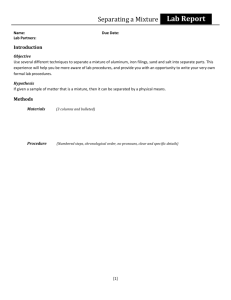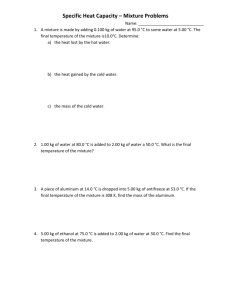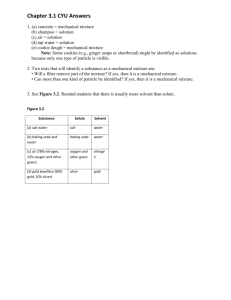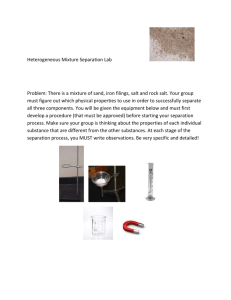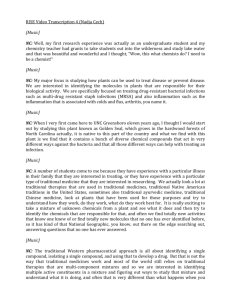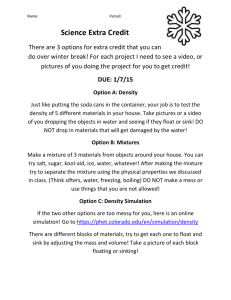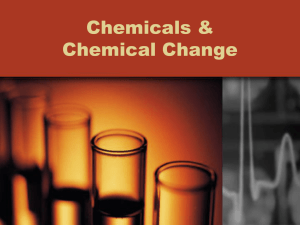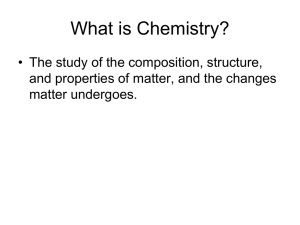Specific Heat Capacity Mixture Problems Worksheet
advertisement
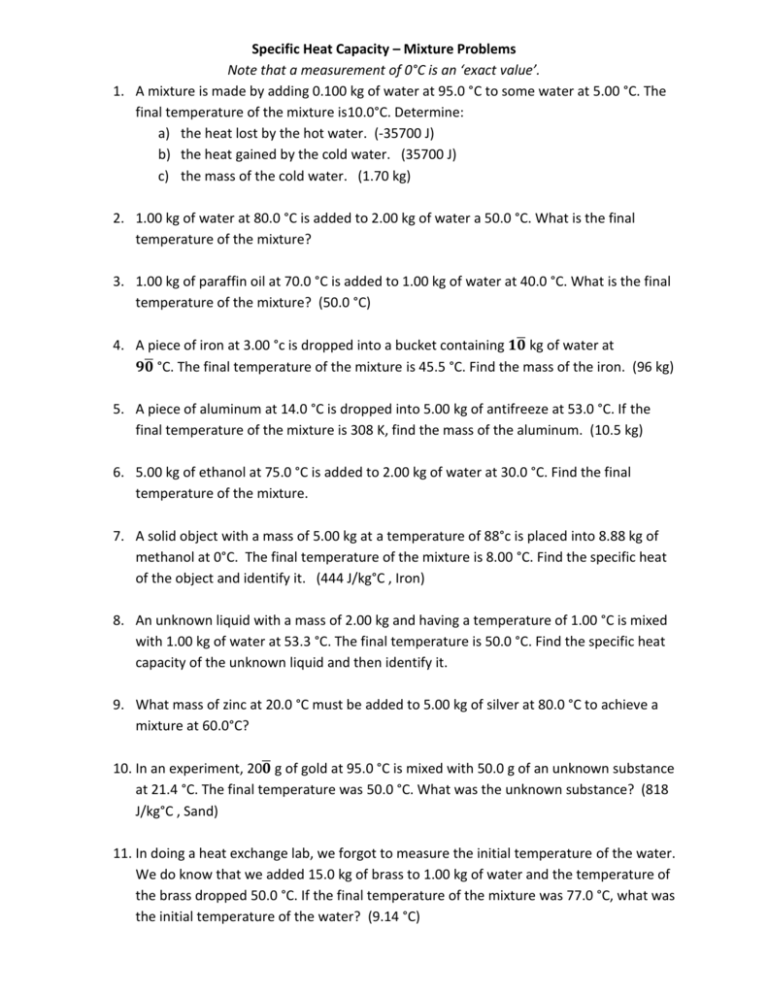
Specific Heat Capacity – Mixture Problems Note that a measurement of 0°C is an ‘exact value’. 1. A mixture is made by adding 0.100 kg of water at 95.0 °C to some water at 5.00 °C. The final temperature of the mixture is10.0°C. Determine: a) the heat lost by the hot water. (-35700 J) b) the heat gained by the cold water. (35700 J) c) the mass of the cold water. (1.70 kg) 2. 1.00 kg of water at 80.0 °C is added to 2.00 kg of water a 50.0 °C. What is the final temperature of the mixture? 3. 1.00 kg of paraffin oil at 70.0 °C is added to 1.00 kg of water at 40.0 °C. What is the final temperature of the mixture? (50.0 °C) ̅ kg of water at 4. A piece of iron at 3.00 °c is dropped into a bucket containing 𝟏𝟎 ̅ °C. The final temperature of the mixture is 45.5 °C. Find the mass of the iron. (96 kg) 𝟗𝟎 5. A piece of aluminum at 14.0 °C is dropped into 5.00 kg of antifreeze at 53.0 °C. If the final temperature of the mixture is 308 K, find the mass of the aluminum. (10.5 kg) 6. 5.00 kg of ethanol at 75.0 °C is added to 2.00 kg of water at 30.0 °C. Find the final temperature of the mixture. 7. A solid object with a mass of 5.00 kg at a temperature of 88°c is placed into 8.88 kg of methanol at 0°C. The final temperature of the mixture is 8.00 °C. Find the specific heat of the object and identify it. (444 J/kg°C , Iron) 8. An unknown liquid with a mass of 2.00 kg and having a temperature of 1.00 °C is mixed with 1.00 kg of water at 53.3 °C. The final temperature is 50.0 °C. Find the specific heat capacity of the unknown liquid and then identify it. 9. What mass of zinc at 20.0 °C must be added to 5.00 kg of silver at 80.0 °C to achieve a mixture at 60.0°C? ̅ g of gold at 95.0 °C is mixed with 50.0 g of an unknown substance 10. In an experiment, 20𝟎 at 21.4 °C. The final temperature was 50.0 °C. What was the unknown substance? (818 J/kg°C , Sand) 11. In doing a heat exchange lab, we forgot to measure the initial temperature of the water. We do know that we added 15.0 kg of brass to 1.00 kg of water and the temperature of the brass dropped 50.0 °C. If the final temperature of the mixture was 77.0 °C, what was the initial temperature of the water? (9.14 °C) 12. When 10.0 kg of antifreeze at 20.0 °C is added to 1.50 kg of water at 85.0 °C, what is the final temperature of the mixture? (34.5 °C) 13. How much helium at 4.00 °C do you need to add to 20.0 kg of hydrogen at 60.0 °C to produce a temperature change of -30.0 °C? The specific heat of helium is 5193 kJ/kg°C. 14. Starting with 10.0kg of ice at-20.0 °c, we add 3.28 kg of an unknown substance at 25.0°C. The final temperature of the mixture is -15.0 °C. What is the unknown substance? (8.00 x 102 J/kg°C , Sand) 15. What is the final temperature of a mixture of2.20 kg of carbon at 20.0 °c and 3.00 kg of copper at 100°C? (54.3 °C) 16. What is the temperature change produced in 5.0 kg of uranium if 10.0 kg of oxygen at 0.60 °C is passed over it? The final temperature of the oxygen is 6.00 °C. 17. What mass of nitrogen at 60.0 °c must be added to 20.0 kg of magnesium at 35.0 °c to achieve a mixture at 40.0°C? 18. If we add 9.30 kg of paraffin oil to 5.00 kg of ethanol, the temperature of the oil is 220 K. The final temperature of the mixture is 7.00 °C. What was the initial temperature of the ethanol? ̅ °C and filled with sand at 20.0 °C. If the final 19. A 𝟓𝟎𝟎 g glass is heated to 𝟏𝟓𝟎 temperature of the mixture is 50.0 °C, what was the mass of the sand? (1.25 kg) 20. A 750 g sample of rubidium is heated to 125°C. When it is dropped into 7.43 kg of liquid at 69.0 °C a mixture with a temperature 70.0 °C forms. What was the liquid? 21. What is the final temperature of a mixture made from 5.00 kg of platinum at 150°C and 5.00 kg of ice at -95.0°C?
